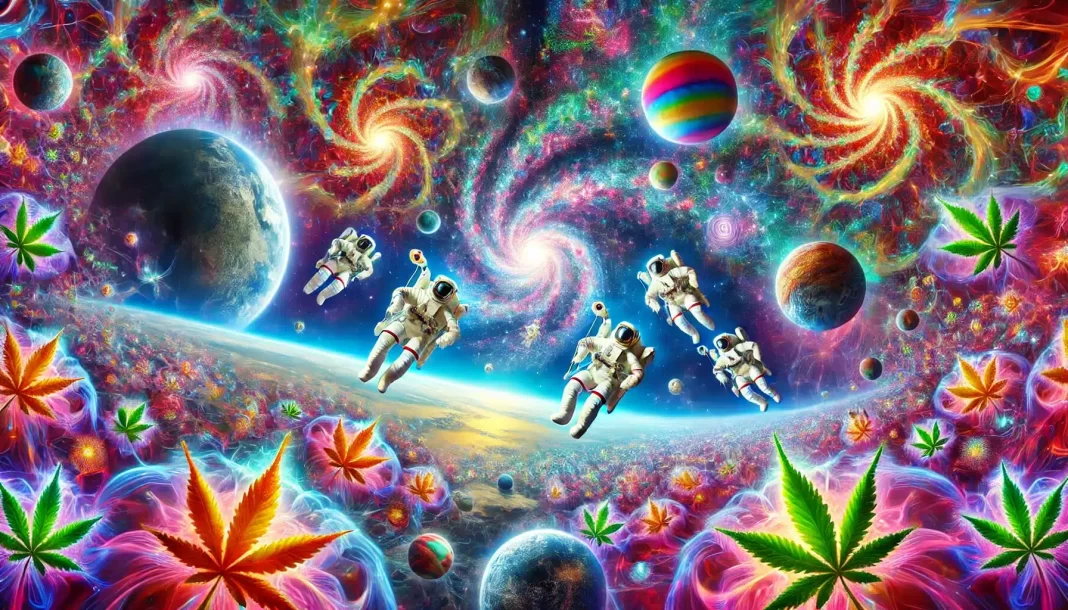As humanity pushes the boundaries of space exploration, questions about mental health and stress management in space are becoming increasingly relevant. Long-term missions to the International Space Station (ISS) and future ventures to Mars present psychological and physical challenges for astronauts, including isolation, confinement, and microgravity. In this context, some have proposed using cannabis and psychedelics as tools to manage stress, pain, and psychological issues in zero gravity. But how do these substances interact with the human body in space?
Cannabis in Zero Gravity
Cannabis, particularly its two main compounds – THC (tetrahydrocannabinol) and CBD (cannabidiol)—has been studied on Earth for its pain-relief, anti-anxiety, and anti-inflammatory properties. Astronauts, who face unique physical challenges like muscle atrophy, back pain, and sleep disturbances due to microgravity, might benefit from cannabis as a potential therapeutic tool.
CBD for Stress and Pain: Research on CBD, a non-psychoactive component of cannabis, suggests that it could help astronauts manage chronic pain and reduce anxiety without impairing cognitive function. In zero gravity, where pain management becomes critical, CBD could provide an alternative to traditional painkillers, which may have adverse side effects over long periods.
THC’s Psychoactive Effects: THC, on the other hand, poses more risks due to its psychoactive properties. In zero gravity, THC’s effects on cognition, coordination, and decision-making could be amplified. Tasks requiring high precision, like operating spacecraft or handling emergency situations, could be compromised if THC impairs astronauts’ abilities. Moreover, the impact of microgravity on drug metabolism is still not fully understood, meaning THC might behave differently in space, potentially leading to stronger or more prolonged effects.
While the potential for cannabis in space remains speculative, legal issues also play a role. Cannabis is classified as a Schedule I drug under U.S. federal law, meaning NASA currently prohibits its use by astronauts, even for medical purposes. However, as private space exploration grows, and with missions originating from countries with more lenient cannabis laws, there could be a shift in policy.
Psychedelics in Zero Gravity
Psychedelics, such as psilocybin (the active compound in magic mushrooms) and LSD, are also being considered for their therapeutic benefits. On Earth, these substances have been shown to help treat depression, PTSD, and anxiety, while promoting emotional resilience and creativity. But what would happen if they were used in space?
Cognitive Effects: Psychedelics like psilocybin are known for altering perception, thought patterns, and emotions. In space, where astronauts need to maintain high levels of mental clarity and focus, using psychedelics poses significant risks. The altered state of consciousness induced by these substances could impair astronauts’ ability to perform critical tasks, especially in emergency situations where split-second decisions are necessary.
Microgravity and Psychedelics: Space presents a unique environment where microgravity affects almost every bodily function, including how drugs are absorbed and metabolized. Psychedelics, which already have unpredictable effects on the human brain, could behave differently in zero gravity, potentially intensifying their effects. Some studies suggest that psychedelics may promote neuroplasticity, enhancing creativity and problem-solving, but the unpredictable nature of these substances makes them difficult to control in a high-risk environment like space.
Group Dynamics: One interesting aspect of psychedelics is their ability to enhance empathy and social bonding. In isolated and confined environments like space stations, where group cohesion is critical, the use of psychedelics could theoretically improve interpersonal relationships and reduce conflicts. However, the potential for bad trips, where users experience intense fear or paranoia, makes their use in space highly controversial.
Psychological Benefits: Why Consider These Substances?
Both cannabis and psychedelics offer promising benefits for mental health, which could be valuable during the psychological strain of long-term space missions. For example, CBD could help astronauts cope with anxiety and sleep disorders without the psychoactive risks associated with THC, while psilocybin has shown promise in enhancing emotional resilience and reducing depressive symptoms.
In theory, microdoses of psychedelics might provide cognitive benefits, such as improved creativity, focus, and problem-solving skills, without the intense hallucinogenic effects of a full dose. This could prove useful for astronauts facing novel challenges in space, though much more research is needed before such an approach could be deemed safe.
Legal and Ethical Challenges
Both cannabis and psychedelics face significant legal hurdles in space. NASA and other governmental space agencies operate under strict drug-free policies, and the use of controlled substances like THC and psilocybin is prohibited. This legal framework extends to international space law, making it unlikely that either substance will be approved for use in government-backed missions anytime soon.
However, the rise of private space companies like SpaceX and Blue Origin could change the legal landscape. As missions become commercialized and space tourism expands, there may be more flexibility in drug policies, particularly on missions originating from countries with more relaxed laws regarding cannabis and psychedelics. This could open the door to the controlled use of these substances for medical or psychological support during long-term space exploration.
Conclusion
While cannabis and psychedelics hold potential for supporting mental health and pain management in space, their use in zero gravity presents unique challenges. CBD could offer stress relief and pain management without impairing cognitive function, while psychedelics might enhance creativity and emotional resilience. However, the risks of cognitive impairment, the unpredictable effects of drugs in microgravity, and the current legal restrictions make their use speculative at best. As space exploration advances, more research will be necessary to determine whether these substances can be safely and effectively integrated into astronaut wellness programs.





